☆ PuniPuni Youtube ☆
How to Say “Anything,” “Anywhere,” and “Anyone” in Japanese – Review Notes
In our last grammar lesson, we learned how to say words like “nothing,” “nowhere,” and “no one” in Japanese.
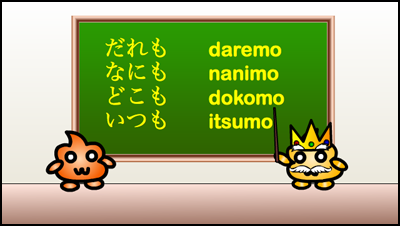
Continuing the theme, today we focused on what we call “any” words, words like “anything” and “anywhere,” in Japanese.
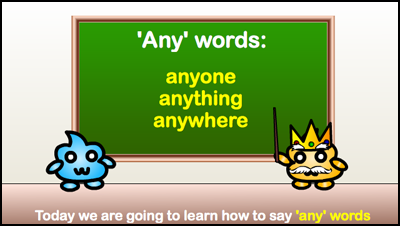
We learned that you can make a “any” word by adding でも (demo) to a question word and using it in a positive sentence!
In these video review notes we will learn more information about today’s grammar and see some more examples!
………………………………………………………………………………..
How to make ‘any’ words in Japanese:
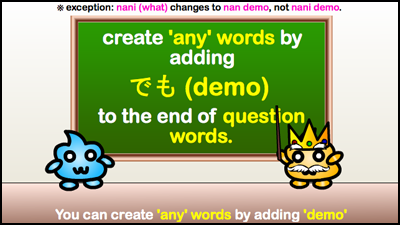
★ To make an ‘any’ word in Japanese, you add でも (demo) to the end of a question word.
★ A slight exception to this rule is the word なに (nani – what) which changes to なんでも (nandemo – anything).
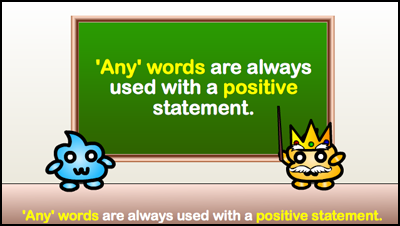
★ ‘any’ words are always used with a positive statement.
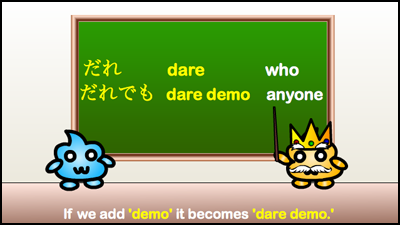
★ だれ (dare) means who in Japanese.
★ だれでも (dare demo) means anyone or whoever.
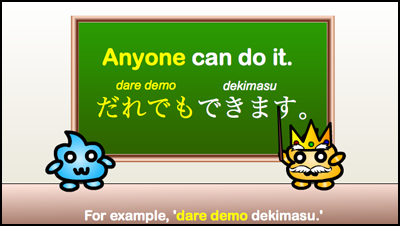
★ For example, だれでもできます (dare demo dekimasu) means ‘Anyone can do it.’
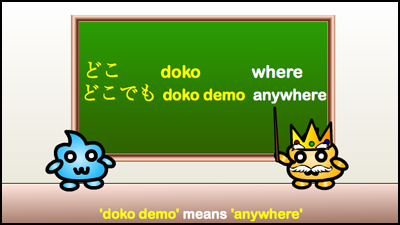
★ どこ (doko) means where in Japanese.
★ どこでも (doko demo) means anywhere or wherever.

★ For example, どこでもいいです。 (doko demo ii desu.) means ‘Anywhere is fine.’
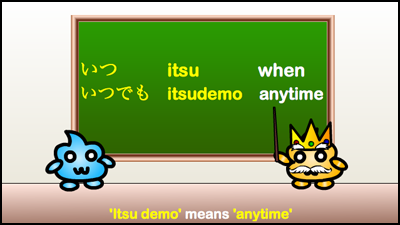
★ いつ (itsu) means when in Japanese.
★ いつでも (itsu demo) means anytime or whenever.

★ For example, いつでも行けます。 (itsu demo ikemasu) means ‘I can go anytime.’
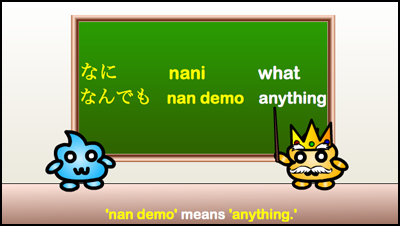
★ なに (nani) means what in Japanese.
★ なんでも (nan demo) means anything or whatever.
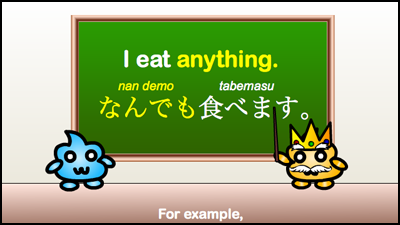
★ For example, なんでも食べます。 (nandemo tabemasu) means ‘I eat anything.’
………………………………………………………………………………..
Extra Examples
Number 1:
だれでも行けます。
Dare demo ikemasu.
Anyone can go.
………………………………………………………………………………..
Number 2:
なんでもします。
Nan demo shimasu.
I will do anything.
………………………………………………………………………………..
Number 3:
どこでもできます。
Doko demo dekimasu.
(You) can do it anywhere.
………………………………………………………………………………..
Number 4:
いつでもいいです。
Itsu demo ii desu.
Anytime is fine.
……………………………………………………………………………….
Conclusion:
Today we learned the Japanese words for “anything,” “anywhere,” “anyone,” and “anytime.”
Do you know how to say “something,” “someone,” and “somewhere” in Japanese? Check out this Japanese grammar lesson to learn how!
……………………………………………………………………………….
Do you want a Japanese tutor?
Take Japanese Skype Lessons with Professional Japanese Teachers on kakehashijapan.com!
………………………………………………………………………………..
………………………………………………………………………………..









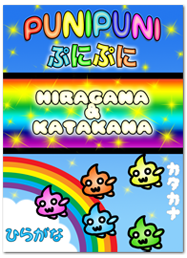
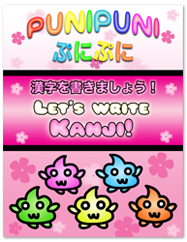


8 comments
The video translated “I eat anything” as “nan demo tabemasu.” But it left out the particle (w)o. Does that mean you don’t need (w)o when “nan demo” is the object of the sentence?
Comment by Stewart on 10/02/2013 at 2:31 amThat is correct! When using “any” words like “nan demo” you should leave out any additional particles like を (o). (◕ω<)b♪
Comment by PuniPuni on 10/02/2013 at 4:26 amis it right to use nan demo as “what ever” ; like if you don’t care about something and say nan demo ?
Comment by iltimass on 06/19/2014 at 10:12 amARIGATOU GOZAIMASU (^-^)
It depends on the situation, but yes it can be used like that. For example, if someone asks you what you want to eat today, you can reply with “nan demo” (anything/whatever). Be aware that this is casual speech. If you want to make it more formal you should say “nan demo ii desu” (anything/whatever is good).
Comment by PuniPuni on 06/21/2014 at 5:50 amwhat is the difference between shimasu and dekimasu
Comment by Noman on 08/08/2014 at 2:03 amdekimasu is the potential form of shimasu. In English, it is similar to “can (do)~”
Comment by PuniPuni on 08/15/2014 at 7:28 pmFor example, you could say 私はテニスをします。(watashi wa tenisu o shimasu) – I play tennis.
Or, you could say 私はテニスができます。(watashi wa tenisu ga dekimasu) – I can play tennis.
daredemo nihongo dekimasu is it correct?
Comment by Pops on 10/27/2014 at 8:22 amIt’s better to say 誰でも日本語が話せます (daredemo nihongo ga hanasemasu) – “Anyone can speak Japanese.”
Comment by PuniPuni on 10/30/2014 at 9:15 am